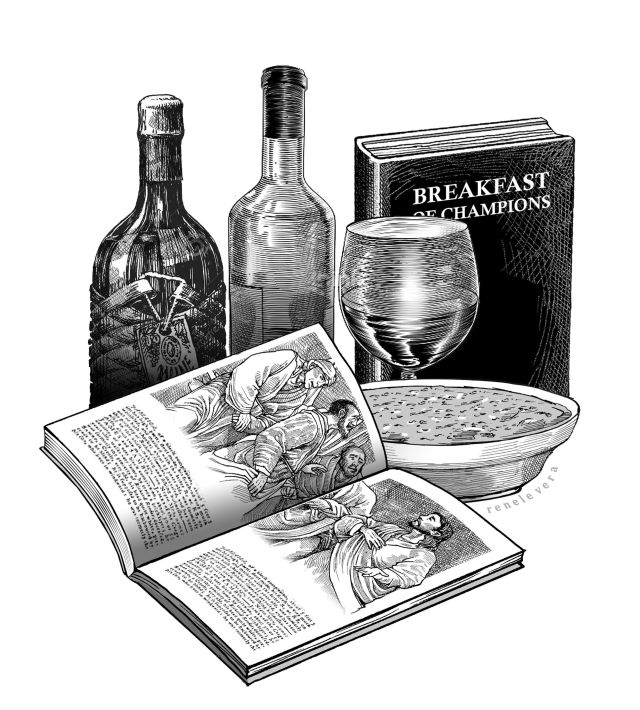
At breakfast – eggs, rice, stewed fish – I thought of works of fiction associated with the morning meal. Easily, Kurt Vonnegut’s 1973 novel “Breakfast of Champions” came to mind. At first I dismissed it, because it really has nothing to do with eating. The only link is that, in the novel, whenever she serves martini, a waitress would say, “Breakfast of Champions” – which is the slogan of Wheaties, a breakfast cereal.
The novel has to do with two elderly men: one, Dwayne Hoover, an unstable businessman; the other, Kilgore Trout, a writer of pulp fiction.
Trout hitchhikes to Midland City to give the keynote address at a local arts festival. In the cocktail lounge of a hotel, he meets Hoover, drawn to Trout when the latter’s white shirt glows as the bartender lowers the light. Hoover accosts Trout and demands a message from him. Trout gives Hoover a copy of his novel, which purports to be a message from the Creator of the Universe telling the reader – which Hoover takes as himself – that he alone has free will, all the others being robots.
The deranged Hoover takes the novel’s message as fact and runs amok.
Vonnegut, the author, enters the novel and approaches Trout as he walks the streets. Vonnegut identifies himself as the Creator of the Universe, to prove which he sends Trout all around the world at will. Trout begs the author to make him young again. The book ends with a full-page drawing of Vonnegut crying.
The novel touches upon many themes – mental illness, suicide, free will, social and economic ills – but mainly it has to do with truth. Truth saves. In his own deranged way, Hoover seeks this truth and salvation, and Trout fulfills this need by presenting Hoover with a work of fiction, which to Hoover is the truth.
Oddly, I find a connection between truth and breakfast. After the night, which can be long and difficult, depending on one’s mental and physical condition, can there be a more welcome event than breakfast, with its gentle light and leisurely conversation?
I find a breakfast which deserves the epithet, breakfast of champions, in the Gospel of John. After Jesus’ death, the disciples returned to Galilee. Peter and John, together with five others, decided to go fishing, but that night they caught nothing. At dawn, they heard someone call from the shore, asking if they had caught anything to eat. No, they told him. The man said, “Cast the net over the right side of the boat and you will find something.” They did, and so huge was the catch of fish that they could not pull it in. At that moment, John recognized the man on the shore, “It is the Lord.”
When Peter heard this, he jumped into the sea and swam ashore. The others followed in the boat, dragging the net with the fish. On the shore they saw a charcoal fire with fish on it, and bread. Jesus said to them, “Bring some of the fish you just caught.” When this was done, he said to them, “Come, have breakfast.” John writes,
“And none of the disciples dared to ask him, ‘Who are you?’ because they realized it was the Lord.”
Hoover sees the white shirt of Trout glowing in the dark – the disciples in the boat must have seen a similar thing, Jesus standing on the shore towards dawn. Hoover suffers from a mental disorder – on their part, the disciples were struggling within themselves, fighting depression caused by the death of Jesus, who they thought would save Israel.
In Trout’s novel, the Creator of the Universe tells Hoover that he alone is possessed of free will, the rest of mankind being mere biological machines. Jesus claimed to be God, and promised his disciples freedom, the freedom of the children of God. His claim of divinity became doubtful, however, when the Romans crucified him. But he rose from the dead.
The disciples needed, not just one but many proofs of Jesus’ rising. And the breakfast on the shore was a further proof of it – during which the disciples met Jesus again, the Author himself of the script of human life, the Creator of the Universe, who served them breakfast, and ate with them.
They only had grilled fish and bread. Which did not matter. Because to Augustine of Hippo, the breakfast was Jesus himself – “The fish roasted is Christ having suffered; He himself also is the bread that comes down from heaven.”
And so, could there be a greater Breakfast of Champions?